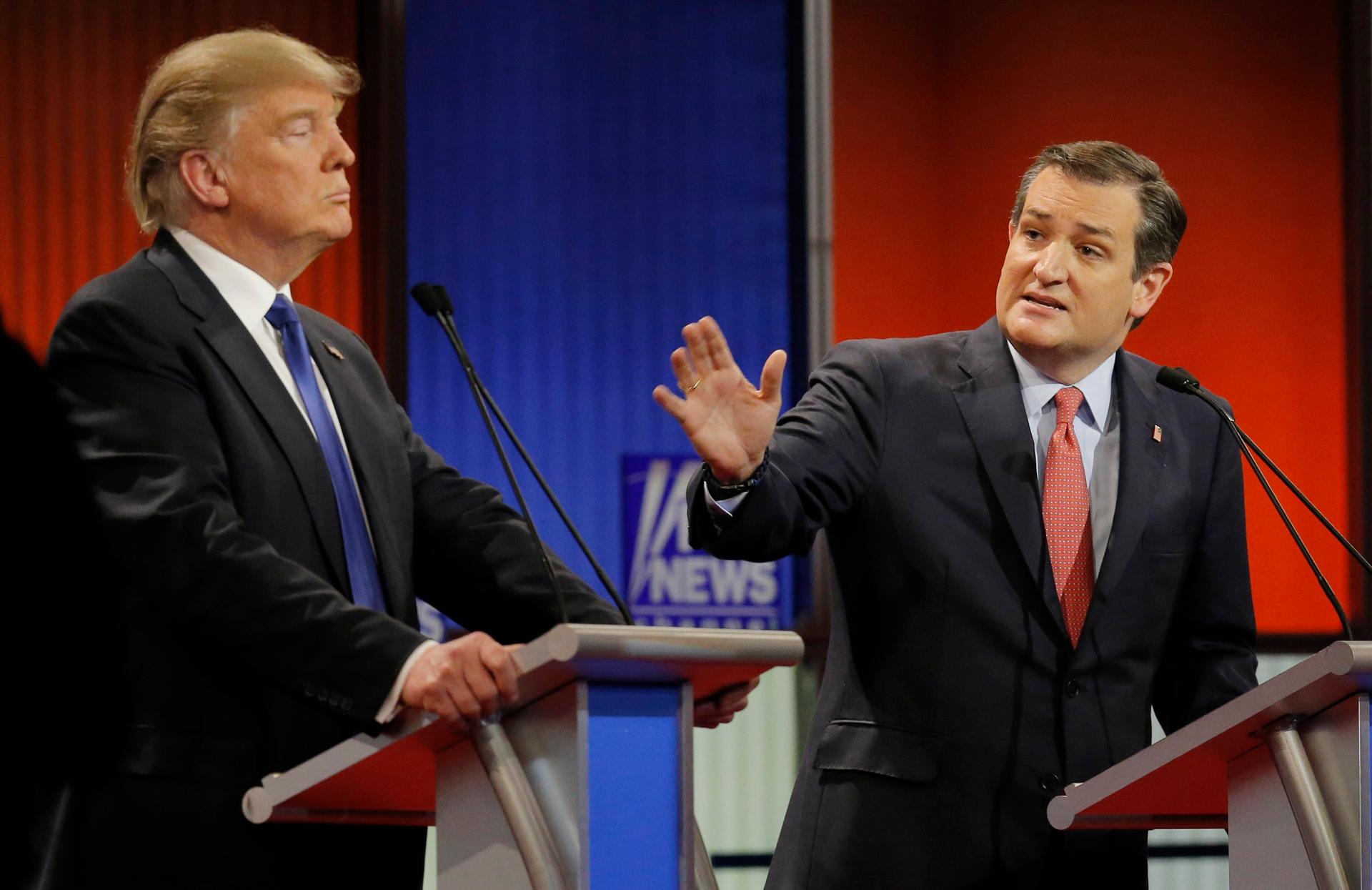Trump reminds her of what her parents fled in Poland — so she’s supporting Ted Cruz
“I despise hearing Donald Trump and his supporters try to convince conservatives to get on the identity politics gravy train. There is a reason I fight it on the left and I am not about to accept it because it wears Republican clothes,” says Ted Cruz supporter Inez Feltscher. Here: Republican presidential candidates Donald Trump and Cruz at a debate in Detroit, Michigan on Mar. 3.
Inez Feltscher's parents fled the totalitarianism of communist Poland.
Her parent's worldview, and her own, was shaped by the Cold War and Ronald Reagan. They came from a generation who grew up behind the Iron Curtain and saw the US as a “shining light on the hill,” a force for good that was the alternative to the the corrupt, paranoid and despotic regime they knew. In college, and later as a law student at the University of Virginia, Feltscher embraced this vision of American exceptionalism, and came to see it as a direct result of how the country was founded — the way the Constitution enshrined the rule of law, checks and balances and limitations on government.
“I think we desperately need a president who puts the Constitution first,” she says. She is supporting the Republican senator from Texas, Ted Cruz, for president. And she is as much anti-Donald Trump as she is pro-Cruz.
Feltscher, 28, was raised in northern California where she grew accustomed to debating liberal peers who dismissed Ronald Reagan as senile. She says her peers saw America as more of a force for imperialism than liberty. But now she fears that what she values most about her country is in peril, and not just from her traditional foils on the left.
Cruz, with his references to Reagan-esque rhetoric and rallying cry to “restore the Constitution” represents the Republican Party she knows. Donald Trump represents something else entirely, she says. He espouses a kind of angry populism more concerned with “winning” than the Constitution. Trump reminds her more of what her parents fled in Poland than what drew them to the US.

Feltscher spoke with us in the first week of March, in between attending sessions at the Conservative Political Action Conference (CPAC), the summit Trump skipped. A conservative activist, she’s built up her Washington, DC, resume with an internship at the Heritage Foundation, a flagship conservative think thank, which led to her current job at the American Legislative Exchange Council, the influential conservative organization that drafts model bills for state legislatures.
She joined the Tea Party in 2009 and has done interviews with Breitbart and NewsMax TV.
Her fear of “government tyranny” is not exactly a novelty in conservative circles, but the stories her parents told about communist Poland during the 70s made the concept much less abstract for her.
“I am aware, in a way that many Americans whose families have been here longer are not, of how fragile a thing American exceptionalism is,” Feltscher says. "Of how remarkable a moment in world history it was when this country was founded on principles of government and Constitution rather than a tribe. Like Ronald Reagan said, 'Freedom is never more than one generation away from extinction.'”
Feltscher is not a fan of identity politics, whatever the flavor. She views it as a “province of the left.” And identity politics is exactly what Trump’s campaign is tapping into, she says — focusing on working class whites.
“I despise hearing Donald Trump and his supporters for trying to convince conservatives to get on the identity politics gravy train. There is a reason I fight it on the left and I am not about to accept it because it wears Republican clothes,” she says.
For instance, she doesn’t think Trump supports the KKK, but sees his initial reluctance to disavow them as signal to a particular kind of voter, one less concerned with the tenets of conservative ideology.
Also: To this shotgun-carrying mosque protester, Trump's anti-Muslim rhetoric has gone too far
“Those people that Trump is dog whistling to, they’re not part of the Tea Party movement," says Feltscher. "They are coming out of the woodwork now because he says a few things that they understand as a dog whistle. I don’t like that. I don’t like those people crawling out from under the rocks. I think they should go back under those rocks.”
In the last week, as violent incidents have marred Trump rallies, she has taken to Twitter to lay blame on the candidate.
It’s not just what she sees as the subtle appeal to racists that bothers her about Trump. As a conservative she is, by definition, worried about limited government and a strict adherence to the rule of law. The latter is why she endorses Cruz’s hard line on illegal immigration, which she compares to “breaking in the back door while someone is throwing a dinner party.”
Trump, she says, doesn't hold those same values.
“If there is anything that is real about the Trump carnival, it’s that he never talks about the Constitution with any degree of reverence,” she says. “He never talks about limitations on government.”
If Trump were to become president, she fears the Republican Party would be reluctant to oppose him and that he would would take full advantage, issuing the kinds of executive orders that conservatives like her have decried as unconstitutional under President Obama.
“I do believe he would use he would use the political machinery of the executive branch to go after every single person who has said anything nasty about him. I think he would be Nixon on steroids,” she says.
At times, she thinks Trump doesn’t necessarily believe what he’s saying and is just playing politics. Other times, what he says “terrifies” her, like his comments that he would order the US military to execute the families of terrorists.
“The US military are not hired guns. They are citizens sworn to uphold the Constitution, and to upload a higher standard than thugs and murders. That was a scary statement in my view,” she says.
Feltscher supports Cruz on many policy points, but his main appeal to her is how he frames his campaign around the Constitution and traditional conservative values. Marco Rubio is her second-choice candidate, but like many Tea Party conservatives, she felt betrayed when he campaigned as a Tea Party candidate and then supported the Gang of Eight's 2013 immigration bill. But she does think he is more conservative that previous establishment picks. As for Ohio governor John Kasich, she sees him as more of a technocratic manager than a conservative, and notes that he has supported Medicaid expansion and Common Core.
She’s no fan of Hillary Clinton either, and would see her election as the continuation of the “same failed policies that have governed this country for the last seven years with Barack Obama.” But Feltscher is a consistent user of the #NeverTrump hashtag on Twitter, meaning she doesn’t plan on voting for him, whether he wins the nomination or not.
Another view: For these Republicans, 'anything I can do' to stop Trump — even if that means backing Clinton
So what will she do if Trump wins the Republican nomination? She’ll vote for a third party candidate, or just vote “down ticket” for other Republican candidates and ignore the presidential race all together.
She hope it doesn’t come to that.
“We can go with somebody who calls us back to the principals of the founding, and the principals that have made America great,” she says. “I do fear that we are running out of time to take that third option.”
This article is part of a Global Nation series that captures the point of view of immigrants and first generation Americans who support each candidate for president. We’ve also profiled an El Salvador-born Marco Rubio supporter, and a Nicaraguan woman who supports Donald Trump.
Our coverage reaches millions each week, but only a small fraction of listeners contribute to sustain our program. We still need 224 more people to donate $100 or $10/monthly to unlock our $67,000 match. Will you help us get there today?
